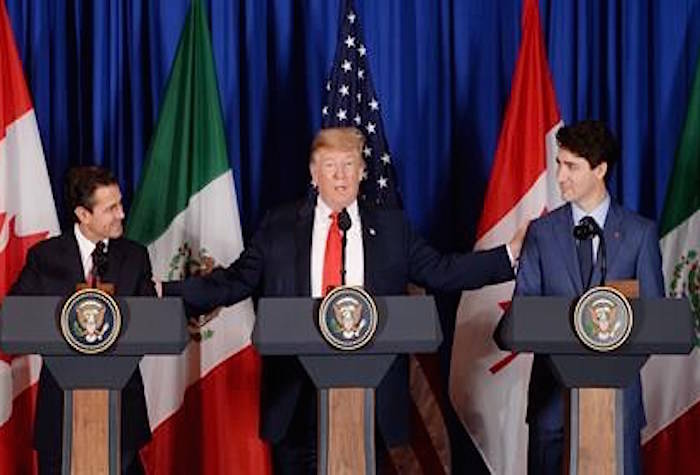After much anticipation, Canada signed the revamped NAFTA in Buenos Aires on the sidelines of the high-profile G20 summit Friday.
Prime Minister Justin Trudeau joined U.S. President Donald Trump and outgoing Mexican President Enrique Pena Nieto at a hotel to formally sign the United States-Mexico-Canada Agreement.
“The new agreement lifts the risk of serious economic uncertainty that lingers throughout the trade renegotiation process — uncertainty that would have only gotten worse and more damaging had we not reached a new NAFTA,” Trudeau said.
“There is much more work to do in lowering trade barriers and in fostering growth that benefits everyone, but reaching a new free trade agreement with the United States and Mexico is a major step for our economy.”
READ MORE: World eyes trade tension as Trudeau arrives at high-drama G20 summit
Trump, standing in between his Canadian and Mexican counterparts, said the new deal was a model agreement that would stop auto jobs from going overseas, protect intellectual property rights and provide robust protections for digital trade and financial services.
U.S. tariffs on steel and aluminum remain in place, but a Canadian official said an advantage to signing onto the agreement now is an auto side letter exempting Canada of potential tariffs on exports of up to 2.6 million vehicles — well above current levels.
Friday marked an important deadline for the trade pact.
A new Mexican president takes over Saturday, who might not honour the tentative deal struck by his predecessor.
The signing of the trade agreement is largely ceremonial, because it will still need to be ratified by all three countries before it can formally take effect.
U.S. lawmakers have already indicated they don’t expect to tackle the USMCA until after the new Congress is sworn in early next year.
The deal — 32 chapters, 11 annexes and 12 side letters — sets new rules for the auto sector, including a higher threshold for North American content and rules requiring 40 per cent of car parts be made by workers paid at least $16 an hour.
It preserves a contentious dispute-resolution system the U.S. dearly wanted gone, extends patent protections for biologic drugs and allows U.S. farmers a 3.6-per-cent share of Canada’s famously guarded market for poultry, eggs and dairy products — a concession that dismayed Canadian dairy producers.
Despite the symbolism of Friday’s signing, Trump has no meetings with Trudeau scheduled while the two are in Argentina.
The Canadian Press



